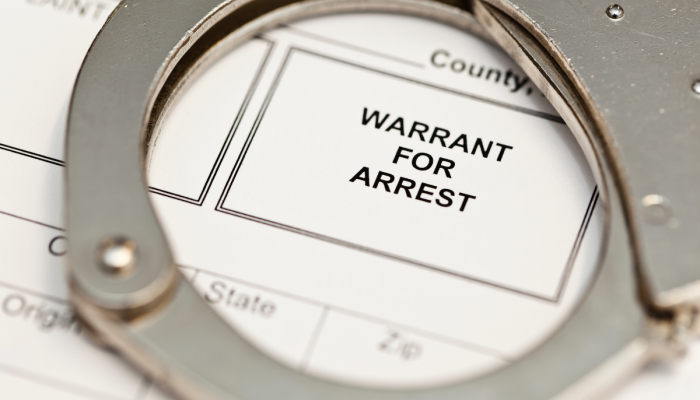You can be arrested in Kentucky for a crime you committed in another state or on an out-of-state warrant for arrest. If you are arrested on an out-of-state arrest warrant, the sooner you seek legal counsel from an experienced criminal defense lawyer, the better.
What Is A Warrant?
A warrant is issued by a judge or magistrate on behalf of the state, which authorizes the arrest and detention of an individual, or the search and seizure of an individual’s property. It generally has your name and the information about the charges against you. There are three primary types of warrants that are commonly issued. In all cases, the police or the District Attorney must first have probable cause before they can request a warrant from a judge.
- Arrest Warrants: Arrest warrants can be issued for a variety of crimes, including misdemeanors and felonies. It is rare when an individual knows that there is a warrant out for their arrest. Typically, they find out when the police come knocking on their door or show up at their place of employment. Once found, the police will take you into custody.
- Bench Warrants: A bench warrant means a judge has issued an order for a defendant’s arrest. Often, the person on whom the warrant is issued has already been charged with a crime but did not appear in court on the designated court date to face charges. This is known as a bench warrant for failure to appear. But a judge can issue a bench warrant anytime a person violates the rules of the court. If you discover you have a bench warrant out, it is a good idea to get a lawyer and turn yourself in as soon as possible. Some people believe they can evade a bench warrant, but those people are almost always wrong.
- Search Warrants: Search warrants are issued when the police or DA have probable cause that they would find evidence of a crime if a search was conducted. Police cannot search you, your vehicle, your home, or your business without a valid warrant. Search warrants can be issued for a variety of reasons and for a variety of crimes.
Can One State See A Warrant From Another State?
When an arrest warrant is issued, the warrant is entered into a searchable database. Kentucky police officers can have access to the database. So let’s say you have a drug charge in another state, you could be arrested in Kentucky on that warrant. Even if you are arrested in another state for any reason, the police will likely see the out-of-state warrant. If this happens, the state where you were initially charged will typically hold a court hearing wherein they prove you are the individual in the out-of-state warrant.
Extradition After A Warrant Is Discovered
If the active warrant is for a felony offense, the police officers will most likely extradite you back to the state where the warrant was issued. Then, you will be brought into custody and await the next steps for a trial. You will most likely not be extradited for a misdemeanor offense warrant unless it is a sex offense. Instead, the misdemeanor warrant can usually be handled quickly with the help of a defense attorney. If the warrant is a bench warrant, you may or may not be extradited and set to appear in front of the judge. In any case, an out-of-state officer who discovers your warrant has the right to arrest you.
Does An Arrest Warrant Ever Expire?
Warrants do not expire after a certain period of time like many hope. Likewise, there is no statute of limitations applicable to one being arrested on a warrant. The warrant must be resolved by your arrest or by a judge dismissing the warrant. You can surrender yourself to law enforcement officials to resolve the arrest warrant.
How To Discover If You Have An Arrest Warrant In The United States
U.S. residents can determine if they have existing warrants in the country by conducting a warrant search.
There are several ways to run this search:
- Request a criminal history record (also called an Identity History Summary Check).
- Search federal court records using the Public Access to Court Electronic Records (PACER) service.
- Search a state’s court website.
- Search a local law enforcement’s official website.
You could contact the local police station to inquire about an arrest warrant. Just remember you could be questioned, and the police may locate you to execute the arrest warrant. You may also check with a bail bond agent to see what they charge for a warrant search. Hiring a criminal defense lawyer may be the best and safest way to determine if you do indeed have an outstanding warrant for your arrest.
Why Do I Need A Criminal Defense Lawyer If I Have An Out-Of-State Warrant?
Ignoring the warrant could lead to you being arrested at work, in public, or at an inconvenient time. Hiring an attorney is likely the simplest, easiest way to clear a warrant. An out-of-state felony arrest warrant typically authorizes law enforcement personnel to arrest you in your home state. Depending on the seriousness of the felony offense, the police may even work with officers in your home state to locate you and facilitate the arrest.
If there is a warrant, legal counsel can help you try and:
- Clear the warrant (for example by securing a court date/court order or making a court appearance)
- Work with the authorities to comply with it.
After the arrest, your criminal attorney will work to resolve the charges against you. If you decide to plead guilty, your lawyer can work with the prosecutor in the other state to possibly arrange for you to serve your sentence in Kentucky instead of going back to the other state.
An arrest warrant is a serious matter. Do not ignore the warrant in hopes that it will go away in time as it will never go away.
Contact us (859-341-2500) for a Free Consultation!
—
 About Grubbs & Landry
About Grubbs & Landry
At Grubbs & Landry, PLLC, we are dedicated to personal and friendly service. We manage our practice in an ethical, cost-effective manner to best help our clients resolve their legal issues with the least expense possible. We pride ourselves in advocating for our client in divorce, child custody, and child support matters as well as other family law matters. We are active in prosecuting personal injury cases-recovering for the injuries our clients sustain due to the negligence of others. Additionally, we help our clients prepare for the future through the preparation of Wills, Power of Attorney and Living Will.

